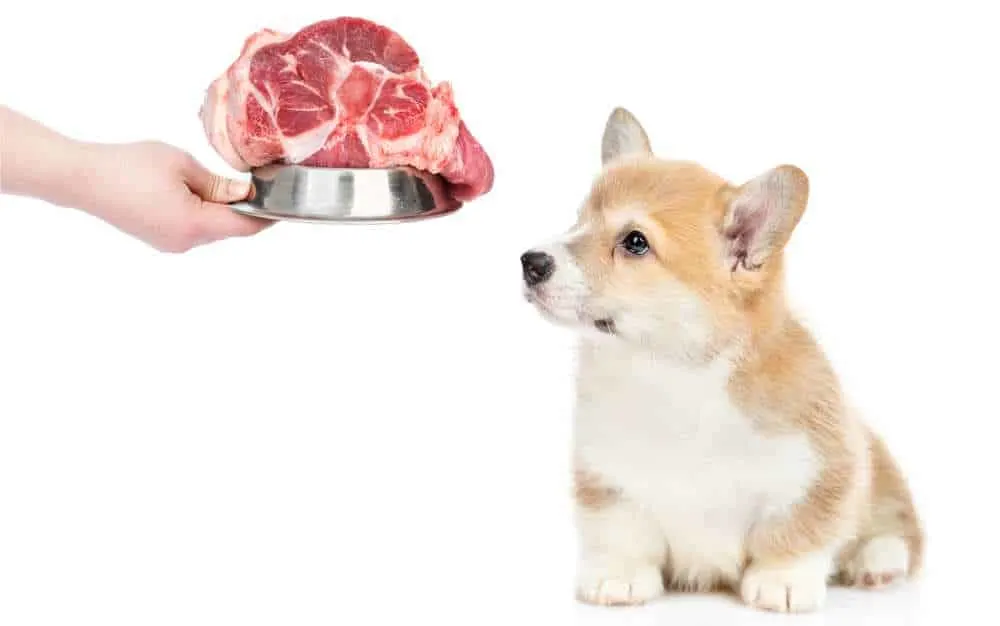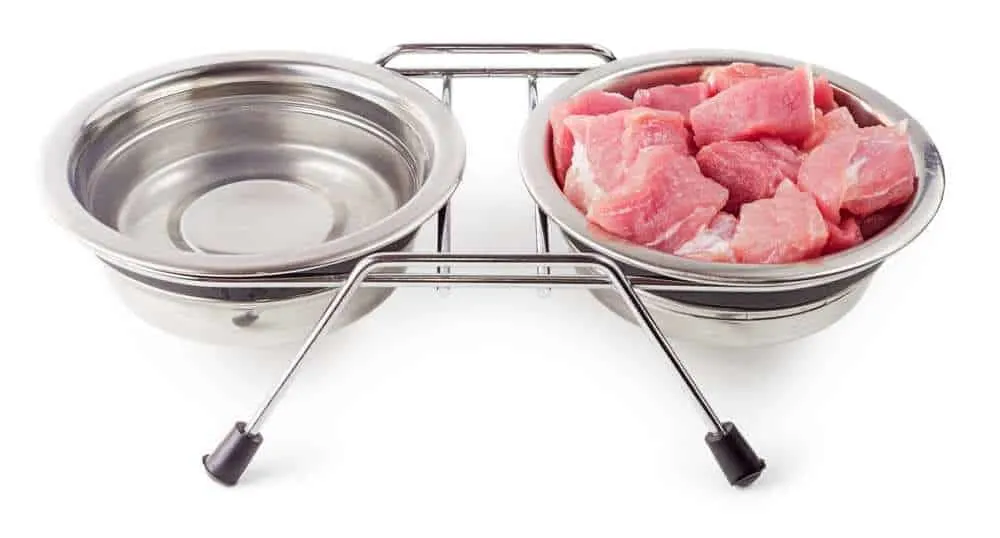It’s Saturday afternoon, and the whole family got together for a barbecue lunch in the backyard. The smell of roasted pork doesn’t leave anyone indifferent, and you bet Charlie is already by the table, drooling on the ground.
As a pet parent, you know how hard it is sometimes to resist those quiet whines and big puppy eyes. So, you gave your dog a small bite of pork, and now you’re wondering was it a good idea after all.
Can Dogs Eat Pork?
This is the question that many pet owners have asked themselves at least once or twice. Fortunately, we have thoroughly examined this topic to give you the best possible answer, so read on!

Can Dogs Eat Pork?
The short answer is – yes, they can. However, only when given in moderation and prepared in a certain way. When fed as a part of a balanced and complete diet, pork can be a great addition as it is nutritious and a good source of protein.
Therefore, let us take a look at the nutritional value of pork per 100 gr:
| Energy | 242 calories |
| Total Fat | 6 gr |
| Cholesterol | 53 mg |
| Sodium | 1,203 mg |
| Potassium | 287 mg |
| Total Carbohydrate | 1,5 gr |
| Protein | 21 gr |
| Vitamin B-6 | 20% |
| Iron | 8% |
| Magnesium | 3% |
| Vitamin D | 8% |
| Cobalamin | 11% |
There are also some decent amounts of vitamin C, niacin, zinc, phosphorus, selenium, and vitamin B-12.
But as you can see, pork contains high amounts of fat and sodium, which are very difficult for dogs to digest. In fact, high amounts of fat can lead to serious health problems such as indigestion and inflammation of the pancreas, also called pancreatitis. Given this, consider feeding your dog with small amounts of pork, and not for every meal.
What About Ham, Bacon, Or Gammon?
Preserved pork is very high in salt content, and this could be too much for the dog’s stomach to handle, and can lead to pancreatitis. It can also contain smoke flavoring chemicals, preservatives, heterocyclic amines, nitrates, and similar, which can be harmful to humans, let alone pets.
But it can also cause another dangerous and potentially deadly condition called ‘Bloat.’ This condition appears when a dog’s stomach fills up with food, fluid, or gas, making it expand. Dogs will become dehydrated due to the high amounts of salt found in processed meat (especially ham), and therefore drink an excessive amount of water. The pressure is then put on other organs, and this could be life-threatening.
Why Is Seasoned Pork Terrible For Dogs?
Generally, dogs can only eat plain pork, without additional add-ons, such as spice rubs and seasonings. Onion powder, nutmeg, and garlic powder are highly toxic and extremely dangerous if ingested.
BBQ sauce is also high in salt and sugar content and usually has additional seasonings. This is why you should think twice before sharing your barbeque meat with your dog. If your dog happens to eat some seasoned meat, keep an eye out for unusual symptoms.
If you notice the following contact your vet immediately:
- Vomiting;
- Lethargy;
- Pale gums;
- Nausea;
- Diarrhea.

Dangers Of Raw Pork
You’re maybe wondering now, can dogs eat raw pork. Technically – yes, they can. But that doesn’t mean they should. The reason for this is that undercooked pork can contain the parasite Trichinella spiralis, which can cause an infection called trichinellosis. These parasites live in the muscles of an animal (pig in this case) and can both affect humans and pets.
Typically, dogs with weaker immune systems will have severe symptoms, but these are the common you should watch out for:
- Vomiting;
- Diarrhea;
- Upset stomach;
- Elevated fever;
- Pain and stiffness;
- Muscle inflammation;
- Lethargy;
- Cramps;
- Inability to chew;
- Seizures;
- Heart failure;
- Respiratory issues.
Contact your vet as quickly as possible if you notice any of the symptoms mentioned above. This doesn’t mean you shouldn’t feed your dog with raw pork as you do with any other meat; it just means that certain risks are involved.
However, you can freeze raw pork for a few weeks in case there are any parasites, as they can’t survive chilly temperatures. If you’re still not sure, but you want to include raw meat in your dog’s diet, try buying it from reliable dog food sources as they usually test for parasites and keep out additives.
Nevertheless, pork is a great source of taurine and protein. Boneless rib meat, butt, shoulder, and loin are excellent choices when considering raw pork. Once again, opinions on raw pork meat are divided, but now with most of the countries free of trichinosis, we think it’s pretty safe to let your pet enjoy meat in its natural state.
What About Pork Bones?
Your dog can eat pork bones, but we don’t recommend this. Feeding dogs with bones is not always safe. Once cooked, bones dry out become brittle and fragile and may splinter into sharp pieces. If swallowed, this could damage your dog’s mouth, internal organs, or throat, and it is a potential choking hazard.
Uncooked bones are a much safer choice, though they could fracture a thin enamel layer on your dog’s teeth. Try buying your dog dental chews or high-quality edible dental bone instead.
Can Dogs Be Allergic To Pork?
Yes, any dog can be allergic to pork and any other meat for that matter. Some of the allergy symptoms are:
- Chest tightness;
- Skin rash or hives;
- Watery, itchy, or red eyes;
- Coughing, shortness of breath, wheezing;
- Facial pain;
- Runny or stuffy nose;
- Itchy or infected ears;
- Swelling of the face, ears, earflaps, eyelids, lips;
- Red inflamed skin;
- Diarrhea;
- Vomiting.
Are There Any Alternatives To Pork Meat?
Protein-rich treats that can easily replace pork meat are chicken, cheese, and peanut butter. Chicken is much easier to digest.

Does Pork Have Any Nutritional Value For Dogs?
The answer is again, yes.
Pork is an essential source of amino acids, and it is rich in thiamine, which is beneficial in cell function. Besides that, pork has proper amounts of vitamin B, iron, zinc, potassium, and other essential vitamins and minerals, as mentioned above.
Because of the high protein content, some potential benefits of feeding your dog pork meat may include:
- Weight regulation;
- Healthy coat and skin;
- Muscle development;
- Tissue repair;
- Healthy cells, tissues, organs;
- Strong bones;
- More energy;
- Easier production of antibodies;
- Improves circulation, etc.
Here are some of the vitamin and mineral benefits found in pork meat:
| Vitamin B | – B vitamins have a crucial role in your dog’s diet. Thiamine is responsible for regulating energy and metabolism and also activates ion channels in neural tissue. Niacin (B3), Cobalamin (B12), and Riboflavin (B2) help promote enzyme function. – Moreover, vitamin B6 is crucial as it is directly responsible for hormone regulation, red blood cell, and nervous system function, immune response, gene activation, and many more. Overall, B vitamins promote healthy digestion, mental focus, prevent kidney stones, asthma, arthritis, and allergies. |
| Vitamin D | – This vitamin is responsible for balancing minerals in a dog’s body such as phosphorus and calcium. It is essential for strong and healthy bones and muscles. |
| Magnesium | – Magnesium is a crucial mineral in a dog’s diet. It controls hormone and metabolic functions, and proper nervous system transmissions. Very important for cardiovascular health. |
| Potassium | – Potassium is essential for the heart and nervous system function. It has a role in regulating muscle contractions, fluids, and in sending nerve signals. |
| Iron | – An essential mineral that has a vital role in physiological processes. It is directly involved in red blood cell formation and hemoglobin, which is responsible for carrying nutrients and oxygen throughout the body. |
So, there you have, all of the good stuff that pork can provide to your pet.

How To Prepare Pork For Your Dog?
As for quantity, feed your dog a small amount for the first time. If there are no adverse reactions to it like allergies or similar, you can continue feeding your pet with pork meat.
When it comes to preparation, there are a few guidelines to follow. First off, remove as much fat as you can from the meat. For safety concerns of parasites, cook it. Don’t use salt or any other seasonings as these could be lethal to your dog. Don’t throw down a pork chop in front of your dog, but instead cut the pork into bite-sized pieces for easier chewing. Also, make sure to cut the meat off the bone, as bones can cause your dog to choke and damage the internal organs if swallowed.
Don’t include preserved pork such as ham, bacon, or gammon as those contain seasonings and a high amount of sodium that can cause pancreatitis and other health problems.
In the end, pork is very good for your dog, but when given in moderation and small portions. It is high in protein and has many minerals, and vitamins essential for your dog’s health. A lot of dog food chains include pork in their products.
However, if you notice any worrisome symptoms, contact your vet and consider giving your dog some alternatives to pork meat.
Learn More: What Can Dogs Eat? A Comprehensive List Of Dog-safe Foods

